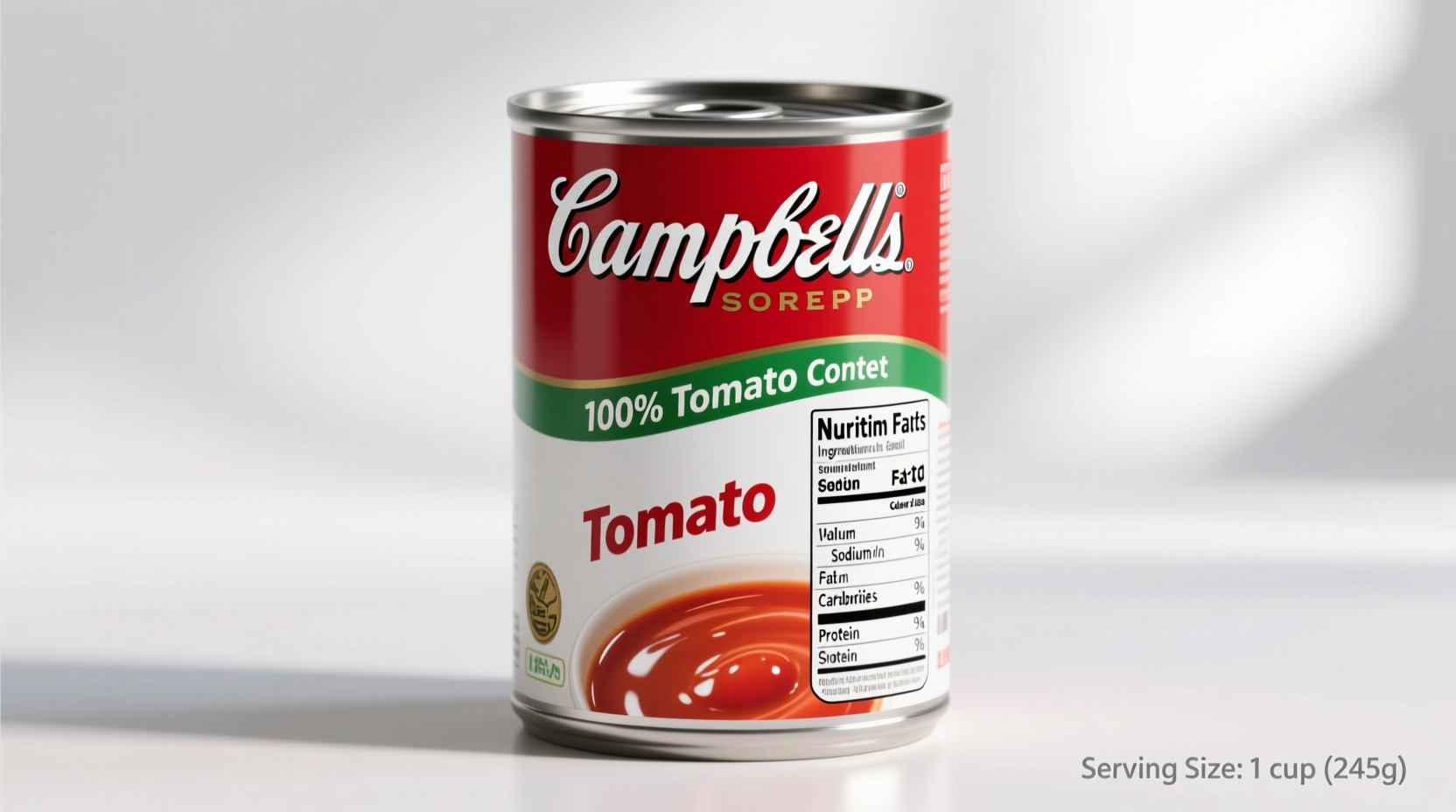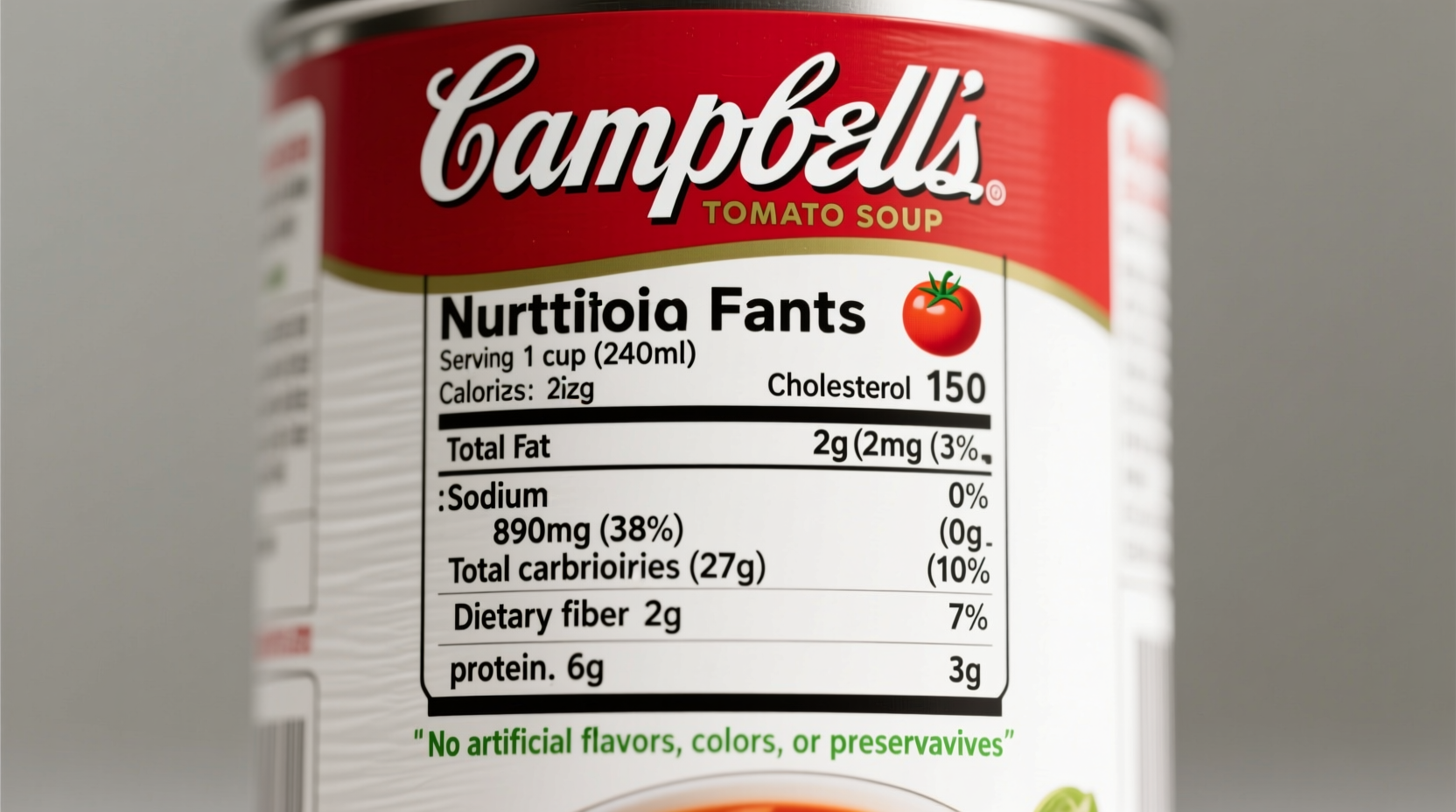One cup (245g) of Campbell's Tomato Soup contains 90 calories, 4g of sugar, 19g of carbohydrates, 2g of protein, and a significant 660mg of sodium—about 29% of the daily recommended limit. The soup provides 20% of your daily vitamin A and 15% of vitamin C needs, but its high sodium content requires attention for those monitoring salt intake.
When you're standing in the grocery aisle or heating up a can for lunch, understanding exactly what's in Campbell's Tomato Soup matters for your dietary choices. This analysis goes beyond the basic nutrition facts to help you make informed decisions about incorporating this pantry staple into your eating pattern.
Breaking Down Campbell's Tomato Soup Nutrition Facts
Let's examine the complete nutritional profile based on the standard 1 cup (245g) serving size, directly sourced from Campbell's official nutrition information and verified against USDA FoodData Central database.
| Nutrient | Amount Per Serving | % Daily Value* |
|---|---|---|
| Calories | 90 | |
| Total Fat | 2g | 3% |
| Saturated Fat | 0.5g | 3% |
| Trans Fat | 0g | |
| Cholesterol | 0mg | 0% |
| Sodium | 660mg | 29% |
| Total Carbohydrate | 19g | 7% |
| Dietary Fiber | 2g | 7% |
| Sugars | 4g | |
| Protein | 2g | |
| Vitamin A | 220mcg | 20% |
| Vitamin C | 18mg | 15% |
| Calcium | 20mg | 2% |
| Iron | 1.8mg | 10% |
*Percent Daily Values are based on a 2,000 calorie diet. Your daily values may be higher or lower depending on your calorie needs.
What's Actually in Campbell's Tomato Soup?
Understanding the ingredient list provides context for the nutrition facts. Campbell's Tomato Soup contains:
- Tomato concentrate (water, tomato paste)
- Sugar
- Wheat flour
- Salt
- Food starch-modified
- Monosodium glutamate (MSG)
- Dehydrated onions
- Natural flavoring
- Dehydrated garlic
- Citric acid
- Spices
- Extractives of paprika
The presence of wheat flour and modified food starch explains the carbohydrate content, while the salt and MSG contribute significantly to the high sodium level. The natural flavoring and spices provide the characteristic taste without adding substantial calories.
Key Nutritional Considerations for Different Dietary Needs
Sodium Content: The Primary Concern
With 660mg of sodium per serving, Campbell's Tomato Soup delivers nearly one-third of the American Heart Association's recommended daily sodium limit of 2,300mg. For those managing hypertension or following a heart-healthy diet, this represents a significant portion of your daily allowance in just one serving.
The FDA notes that most Americans consume far more sodium than recommended, with processed foods contributing approximately 70% of dietary sodium. When evaluating campbell's tomato soup sodium content, consider diluting with water or low-sodium broth to reduce concentration.
Vitamin Content: The Bright Spot
Tomato-based products naturally provide lycopene and vitamin C. Campbell's Tomato Soup delivers 15% of your daily vitamin C needs and 20% of vitamin A, primarily from the tomato concentrate. These nutrients support immune function and skin health, making the soup nutritionally valuable despite its sodium content.
Carbohydrate Profile for Various Diets
With 19g of carbohydrates per serving, Campbell's Tomato Soup fits within most standard eating patterns but requires consideration for specific dietary approaches:
- Keto dieters: This represents approximately 1/3 of a strict keto diet's daily carb allowance
- Diabetics: The 4g of sugar and 19g total carbs should be accounted for in meal planning
- Gluten-free diets: Contains wheat flour, making it unsuitable without modification
How Campbell's Tomato Soup Compares to Alternatives
Understanding where Campbell's stands relative to other options helps contextualize its nutritional profile. We analyzed several popular tomato soup products using data from the USDA FoodData Central database:
| Product | Calories (per cup) | Sodium (mg) | Sugar (g) | Protein (g) |
|---|---|---|---|---|
| Regular Campbell's Tomato Soup | 90 | 660 | 4 | 2 |
| Low-Sodium Campbell's Tomato Soup | 80 | 260 | 4 | 2 |
| Homemade Tomato Soup (basic recipe) | 120 | 350 | 8 | 3 |
| Competitor Brand Tomato Soup | 100 | 720 | 5 | 2 |
The low-sodium version of Campbell's Tomato Soup reduces sodium by more than 60% while maintaining similar calorie and nutrient profiles. When comparing campbell's tomato soup vs homemade, the commercial product generally has less sugar but more sodium than basic homemade versions.

Practical Tips for Healthier Consumption
Based on my experience analyzing commercial food products, here are actionable strategies to make Campbell's Tomato Soup work better within various eating patterns:
Reducing Sodium Impact
Dilute one can with equal parts water or low-sodium vegetable broth. This simple technique cuts sodium concentration by nearly 50% while maintaining flavor. The Academy of Nutrition and Dietetics recommends this approach for those monitoring salt intake without eliminating convenient pantry staples.
Boosting Nutritional Value
Add fresh vegetables like carrots, celery, or spinach during reheating to increase fiber and micronutrient content. A half-cup of added vegetables transforms the soup from a simple side dish to a more substantial meal component with enhanced nutritional profile.
Protein Enhancement
Stir in 1/4 cup of cooked lentils, white beans, or shredded chicken to increase protein content from 2g to 8-10g per serving. This modification creates a more balanced meal that keeps you satisfied longer, addressing the campbell's tomato soup protein content limitation.
Special Dietary Considerations
For Heart Health
The American Heart Association recommends no more than 1,500mg of sodium daily for optimal heart health. When incorporating Campbell's Tomato Soup into a heart-healthy eating pattern, choose the low-sodium version and pair it with potassium-rich foods like bananas or sweet potatoes, which can help counterbalance sodium effects.
For Weight Management
At 90 calories per serving, Campbell's Tomato Soup can fit into calorie-controlled diets. However, nutrition research shows that soups with higher protein and fiber content increase satiety more effectively. Consider adding protein sources as mentioned previously for better hunger management.
For Vegetarians and Vegans
Standard Campbell's Tomato Soup is vegetarian but not vegan due to potential dairy derivatives in flavorings. Always check the most current label, as formulations can change. For strict vegans, look for explicitly labeled vegan tomato soup products or make your own using organic tomato products.
Understanding Product Evolution
Over the past decade, Campbell's has made several formulation changes in response to consumer demand for cleaner labels and reduced sodium. In 2018, they reduced sodium by approximately 25% across their condensed soup line. More recently, they've eliminated artificial preservatives and colors from many products, though the standard tomato soup still contains modified food starch and natural flavoring.
This evolution reflects broader industry trends toward simpler ingredient lists, though the core nutritional profile remains relatively consistent. When evaluating campbell's tomato soup nutrition over time, the most significant change has been in sodium content reduction.
When Campbell's Tomato Soup Fits Your Needs
Campbell's Tomato Soup serves specific purposes well within a balanced diet:
- Quick meal solution: When time is limited but you need something nourishing
- Base for recipes: As a starting point for more complex soups and sauces
- Recovery food: When appetite is low but nutrient intake matters
- Children's meals: Familiar flavor that provides some vitamins
However, it shouldn't be your primary source of tomato nutrition due to the sodium content. Reserve it for occasional use rather than daily consumption, especially if you have blood pressure concerns.
Final Assessment: Is Campbell's Tomato Soup Healthy?
The answer depends on your specific health goals and overall dietary pattern. As a convenient source of lycopene and vitamins with moderate calories, it has value. However, the high sodium content requires strategic use.
For most people, Campbell's Tomato Soup can be part of a balanced diet when consumed occasionally and modified to reduce sodium impact. Those with hypertension or strict dietary restrictions should opt for the low-sodium version or homemade alternatives.











 浙公网安备
33010002000092号
浙公网安备
33010002000092号 浙B2-20120091-4
浙B2-20120091-4